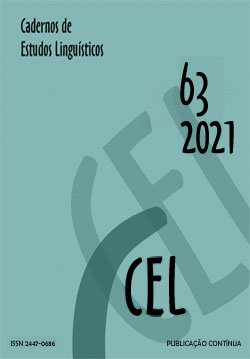Abstract
The aim of this study is to analyze the mythification process of the teacher’s work in the pedagogical discourse materialized by discursive sequences collected from the section “Caro Educador” of Revista Nova Escola. To this end, we based this investigation on the interface between the Pecheutian Discourse Analyses principles and Roland Barthes’s Theory of Myths. The hypothesis of this paper is that the pedagogical discourse registered in Nova Escola takes over a memory domain in which pedagogical and religious discourse are connected by the reference statement: every teacher is/must be an educator. This statement consolidates an interdiscursive relation between pedagogical and religious discourses and provides evidence for a conception of teaching as missionary work or divine calling. The results of these analyses show that, in different ways, the teaching work is signified by the absence of its marketing sense. Marked by an aura of nobility and spirituality, the teacher’s activity is strongly charged by the priestly sense.
References
ALVES, R. A Alegria de Ensinar. 3.ed. Campinas: Ars Poetica, 1994.
ALVES, Rubem. Conversas com quem gosta de ensinar. São Paulo: Cortez/Autores associados, 1980.
BARTHES, Roland. A aventura semiólogica. Tradução brasileira de Mário Laranjeira. São Paulo: Martins Fontes, 2001.
BARTHES, Roland. Mitologias. Tradução brasileira de Rita Buongermino, Pedro de Souza e Rejane Janowitzer. Rio de Janeiro: DIFEL, 1980.
COURTINE, Jean-Jacques. Análise do discurso político: o discurso comunista endereçado aos cristãos. Tradução brasileira de Cristina de C. Velho Birck et al. São Carlos: EdUFscar, 2009.
COURTINE, Jean-Jacques. Metamorfoses do discurso político: as derivas da fala pública. Tradução: Nilton Milanez, Carlos Piovezani Filho. São Carlos: ClaraLuz. 2006.
COURTINE, Jean-Jacques. “O chapéu de Clémentis. Observações sobre a memória e o esquecimento na enunciação do discurso politico”. Traduzido por Marne Rodrigues de Rodrigues. In: INDURSKY, Freda & FERREIRA, Maria Cristina Leandro (Org.). Os múltiplos territórios da Análise do Discurso. São Paulo: Sagra Luzzatto, 1999. pp. 15-22.
FREIRE, Paulo. Pedagogia do oprimido. 66. ed. Rio de Janeiro/São Paulo: Paz e Terra, 2019a.
FREIRE, Paulo. Pedagogia da autonomia: saberes necessários à prática educativa. 58. ed. Rio de Janeiro/São Paulo: Paz e Terra, 2019b.
HENRY, Paul. A ferramenta imperfeita: Língua, sujeito e discurso. Tradução brasileira: Maria Fausta P. de Castro. 2.ed. Campinas, SP: Editora Unicamp, 2013.
HENRY, Paul. “Construções relativas e articulações discursivas”. Tradução de João Wanderley Geraldi e Celene Margarida Cruz. Cadernos De Estudos Linguísticos, 19, 1990. pp. 43-64. https://doi.org/10.20396/cel.v19i0.8636825
PÊCHEUX, Michel. Semântica e discurso: uma crítica à afirmação do óbvio. Tradução brasileira de Eni Puccinelli Orlandi et al. 5.ed. Campinas, SP: Editora da Unicamp. 1997.
PÊCHEUX, M. “Análise automática do discurso”. In: GADET, F.; HAK, T. Por uma análise automática do discurso: uma introdução à obra de Michel Pêcheux. Campinas: Editora da Unicamp, 1990. pp. 61-162.

This work is licensed under a Creative Commons Attribution-NonCommercial 4.0 International License.
Copyright (c) 2021 Cadernos de Estudos Linguísticos


